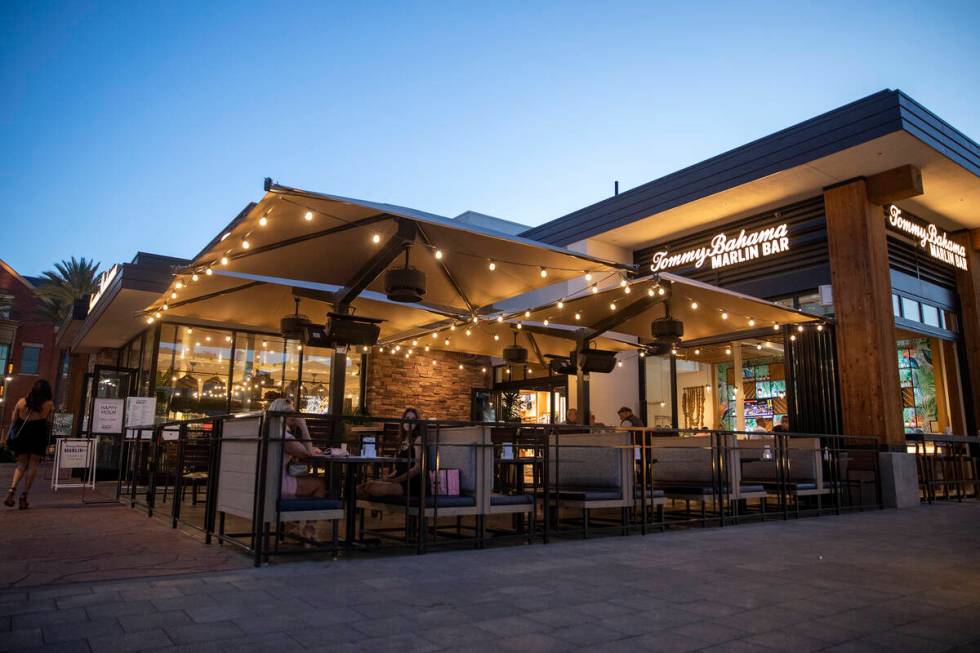Tommy Bahama trades restaurant for Marlin Bar to reflect times

As a company, Tommy Bahama has been adept at capturing the zeitgeist, dating to its role as one of the pioneers of the restaurant-meets-retail operation. Now, it’s beginning another chapter, which is playing out in Las Vegas with the closing of one restaurant and opening of another.
Tommy Bahama Marlin Bar opened recently across the Town Square park from the former Tommy Bahama Restaurant, which closed in August. Company CEO Doug Wood said the move came about because of shifts executives noticed a few years ago.
“We kept watching the behavior of guests,” Wood said. “What we’re seeing is guests don’t want to commit to 2½ hours for dinner anymore. And we kept watching the food truck phenomenon. And we’ve got a problem with getting people to leave their houses; you can do anything on your couch now.”
Dina Mitchell, an entrepreneur and former owner of the Tropical Smoothie franchises for Nevada and Southern California, has the same thoughts for the chain she’s launching, PowerSoul Cafe.
“I think 2020 really brought to light a lot of things for the restaurant industry,” Mitchell said. “One, that there were things they could correct. Two, that people were OK with not having full service; people were OK with not having human contact. People were OK with delivery.”
PowerSoul Cafe, which Mitchell plans to launch in the summer at Warm Springs and Cimarron roads, will be a 100 percent gluten-free restaurant. More to the point, it will operate 24 hours and have self-serve smart food lockers and walk-up windows.
“It puts you more in control of where you’re dining, when you’re dining,” she said. “You’re in full control. 2020 kind of pushed people to make changes a little sooner than they thought they would.”
Wood said Tommy Bahama noticed the coming shifts even earlier, launching what he calls the “great experiment” in 2017 in Estero, Florida.
“What if we slapped a food truck on a retail store?” Wood said they wondered. “And what we’re known for is great cocktails. That’s where the Marlin Bar came from, this idea of let’s have a patio and a bar.”
While Tommy Bahama Restaurant offered table service, at the fast-casual Marlin Bar the guest orders at the bar and food is brought to the table. The majority of seating is on the restaurant’s expansive outdoor patio, with cooling and heating amenities. Live music is offered daily.
The menu has been streamlined, with five snacks (coconut shrimp, Buffalo cauliflower), five tacos, four “handhelds” (Cuban sandwich, Nashville hot chicken sliders) and five salads and bowls (grilled chicken and mango salad, ahi poke bowl), plus five desserts.
“They’re smaller portions at half the price,” Wood said, with the goal of getting the food out in seven to nine minutes.
There are 15 cocktails, with a definite emphasis on the tropical (mai tai, frozen mai tai, pineapple-coconut mojito), plus beers, wines and nonalcoholic specialty drinks. And whatever you’re drinking, you’ll get it right away.
“I’m a guy who wants to have a beer immediately,” Wood said. “The whole idea is skipping the first several steps of a normal restaurant experience.” But you won’t have to pop up for refills.
“When you order a beer, it’s counter service, but it’s counter service-plus,” he said. “Once you sit down, I’ll come by and see if you want another drink. What we’re trying to do is bring a much different dining experience, but one that in our minds, at least, is exactly where the guest is today.”
And they may be on to something.
“I think they’re on a good track with this,” said Joseph Lema, professor and chairman of the department of food and beverage and event management at UNLV’s Harrah College of Hospitality. “Moving toward the fast casual, they can be more flexible and nimble,” which, he said, will help cope with COVID-era and post-COVID challenges such as staffing shortages, rising food costs and supply chain breakages, because they can pivot easier when necessary.
“The supply chain is a challenge we have to adapt very quickly to,” Lema said. “A lot of restaurants want to build consistency. In this segment of the market, it’s a little easier to be able to deliver.”
Cross-training of employees is easier in a fast-casual setting as well, he said, which means staff can be used when needed and also trained to be future leaders. “In fine dining, you’re more in lockstep,” Lema said.
While it was conceived before the pandemic, the Marlin Bar’s mostly outdoor atmosphere and abbreviated service model also are in keeping with the times.
“COVID has changed everything,” Wood said, “but I’m a big believer that sometimes you get lucky, sometimes you’re good. What do people want to do during COVID? They want to sit outside to eat. We’ve just watched all of our patio businesses explode. COVID has absolutely changed people’s behavior.” And with the new business model, he said, “there are a lot less table visits and interactions.”
Lema pointed out that the open-air atmosphere fits with Tommy Bahama’s tropical brand image but resonates with customers.
“They feel that it’s a little safer,” he said. “You can take off the mask and breathe easier. You can feel more free.”
Wood said the company now has 14 Tommy Bahama Restaurants and eight Marlin Bars (“the reaction has been beyond our wildest dreams”), and Las Vegas is the first time they’ve closed one and opened the other at the same location.
“The Las Vegas market is perfect for a Marlin Bar,” he said. “We’re just on the other side of the park now. People can be in the middle of the activity, of the soiree. This is the formula for Marlin Bars: ‘I want to hear music, feel like I’m part of the community, and oh, at the same time, if I want to shop, I’ll shop.”
Contact Heidi Knapp Rinella at hrinella@reviewjournal.com. Follow @HKRinella on Twitter.